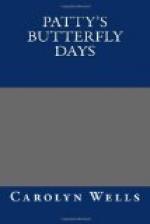“Perhaps the sea air will make you stronger after a time,” suggested Patty.
“Oh, I hope so; I hope so. But I fear not. However, I am trying a new treatment, combined with certain medicines, which I am sure will help my failing health. They tell me I am always trying new remedies. But, you see, the advertisements recommend them so highly that I feel sure they will cure me. And, then, they usually make me worse.”
The little lady said this so pathetically that Patty felt sorry for her.
“But you have a doctor’s advice, don’t you?” she asked.
“No; I’ve no faith in doctors. One never knows what they put in their old prescriptions. Now when I buy one of these advertised medicines, they send me a lot of little books or circulars telling me all about it. This last treatment of mine sends more reading matter, I think, than any of the others, and their pamphlets are so encouraging.”
“But, Aunt Adelaide,” broke in Mona, “if you’re somewhat of an invalid, how did you come to promise father that you’d look after us girls this summer?”
“I’m not an invalid, my dear. I’m sure a few more weeks, or perhaps less, of this cure I am trying now will make me a strong, hearty woman.”
Patty looked at the weak little creature, and concluded that if any medicine could make her strong and hearty, it must indeed be a cure-all.
“May I call you Aunt Adelaide, too?” she said, gently, for she wanted to be on the pleasantest possible terms with Mrs. Parsons, and hoped to be able to help her in some way.
“Yes, yes, my dear. I seem to take to you at once. I look upon you and Mona both as my nieces and my loved charges. I had a little daughter once, but she died in infancy. Had she lived, I think she would have looked like you. You are very pretty, my dear.”
“You mustn’t tell me so, Aunt Adelaide,” said Patty, smiling at her. “It isn’t good chaperonage to make your girls vain.”
“Mona is pretty, too,” went on Mrs. Parsons, unheeding Patty’s words. “But of a different type. She hasn’t your air of refinement,—of class.”
“Oh, don’t discuss us before each other,” laughed Mona, good-naturedly. “And I’m jealous and envious enough of Patty already, without having those traits fostered.”
“Yes,” went on Aunt Adelaide, reminiscently, “my little girl had blue eyes and golden hair,—they said she looked like me. She was very pretty. Her father was a plain-looking man. Good as gold, Henry was, but plain looking. Not to say homely,—but just plain.”
A faraway look came in the speaker’s eyes, and she rambled on and on about her lost husband and daughter, until Patty looked at Mona questioningly.
“Yes, yes, Aunt Adelaide,” Mona said, speaking briskly; “but now, don’t you want to change your travelling gown for something lighter? And then will you lie down for a while, or come with us down to the west veranda? It is always cool there in the morning.”




